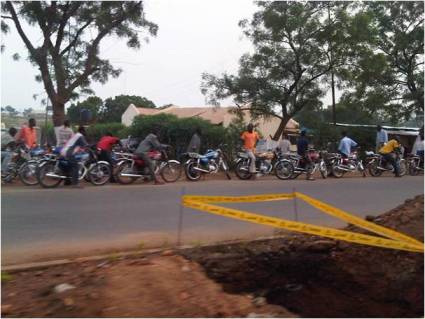
Photo: A line of “boda bodas” queuing for fuel along the main road in Juba town
For the past three weeks I have been working in Juba, South Sudan. In a meeting with the government last week, an official said to me, “…we are dreaming, but come July 9th everything will change and our dreams will become reality.”
On July 9th South Sudan will become an independent country, following the longest civil war in African history.
Driving through Juba, one cannot fail to notice the preparations taking place; from the exceptionally clean streets and banners spread across public buildings to the soon-to-be national anthem on repeat on the radio. There is a sense of excitement, longing and hope.
However, tension surrounding the conflict in South Kordofan casts a cloud on celebrations and underscores the risks ahead.
In June, Khartoum cut off fuel supplies to South Sudan, forcing the government to import fuel from Kenya and Uganda. As a result, a black market for fuel has developed and the cost of fuel at the pump more than doubled between May and June, reaching about 5 Sudanese pounds ($1.67 USD) per liter in Juba and even higher in some rural areas.
Additionally, the flow of goods and services along the north and south borders has been suspended, and complications from northern civil servants manning the southern border with Uganda and Kenya have further increased the general cost of living in the South.
Unfortunately, fuel shortage is not the only challenge the government of South Sudan would have to address post independence. An estimated 98% of public revenue comes from oil and over 50% of the population lives below the poverty line of 72.9 Sudanese pounds ($24.3 USD) per month (see Gabriel’s post). Moreover, decades of civil war have constrained human resource development, further weakening institutional capacity and service delivery.
As the donor presence expands in Juba ahead of independence, increased coordination among development partners is of particular importance as it will streamline assistance and enhance government decision making, helping to transform the fragile territory into a stable nation state.
At the same meeting with the government I mentioned above, another government official emphasized this point: “We have so many challenges. When our partners work together, it makes their assistance more effective.”


Join the Conversation